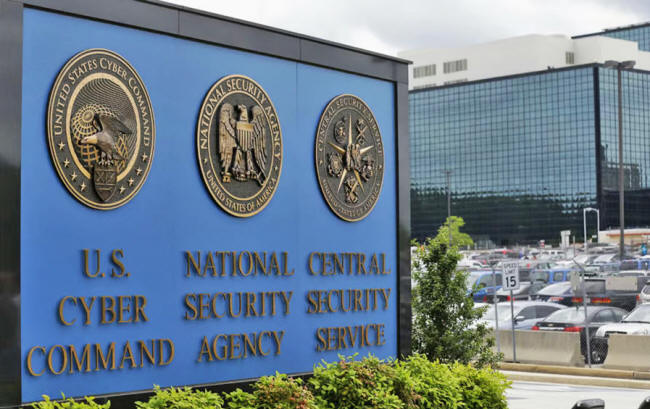|
in Fort Meade, Maryland. (AP Photo / Patrick Semansky)
surely it's not useful to think of the competing interests it represents
as
monolithic...
Until recently, the phrase "deep state" had been mostly consigned to the bowels of the conspiratorial deep web, but over the past few weeks (February 2017), since Donald Trump decided to take his fight with the intelligence community public, it has witnessed a remarkable florescence.
The "deep state" apparently has Trump in its sights, at least according to former NSA intelligence analyst John Schindler, who tweeted that,
What is the "deep state"?
Things are bad, but not as bad as Turkey or Egypt, the Times says, which really do have deep states; and besides, leaks from the deep state will save us from the deep state.
If you do a search on a scholarly database, like Jstor, for the term, you'll get lots of returns having to do with hypnosis, psychology, and spiritualism.
This, in a way, is appropriate, since these activities have to do with the "obscure" interior life of individuals - that is, the opposite of collective categories such as the "public" and the "social," realms that are presumed in modern democracies to be subject to procedural scrutiny and "freedom of information."
But what we call modernity didn't just create the public realm subject to public law.
It created the private sphere, centered on the ideal of the property-owning individual and private corporation, and which during our modern times have enshrined Bacon's and King James I's ideal.
Even the dogged Seymour Hersh didn't have much luck when he tried to investigate "the private sector," as opposed to his métier, the national security state:
Hersh gave up, and wrote his book on Henry Kissinger (The Price of Power - Kissinger in the Nixon White House) instead.
So at least as long as there has been private property, there has been private plotting, and talk of a "deep state" has been a vernacular way of describing what political scientists like to call "civil society," that is, any venue in which powerful individuals, either alone or collectively, might try to use the state to fulfill their private ambitions, to get richer and obtain more power.
The first use of the exact phrase I managed to find is this:
Trump might not have control of the deep state, but he does preside over a very sad state.
The problem with the phrase "deep state" is that it is used to suggest that dishonorable individuals are subverting the virtuous state for their private ambitions.
A good Marxist, and even an intelligent liberal, however, knows that under capitalism, ambition is considered a virtue, not a vice, and that the whole point of government is to collectively organize subversion.
It's this public virtue/private vice false opposition that makes so much of the "deep state" writing slide into, if not noxious Bilderberg anti-Semitism, then "we are a republic, not an empire" idiocy.
But the concept resonates, especially since the modern state is not just an instrument to execute elite ambition but a site of popular demands and class struggle.
The private, organized backlash to those demands and struggles is often understood as a "deep state" conspiracy, and that understanding is more often than not correct.
The Koch brothers know this, at least according to Jane Mayer's Dark Money.
Kevin Ovenden tells me the term "deep state" was regularly used to discuss Turkish politics in the 1990s, especially the secretive power exercised by the military, bureaucracy, and courts against democratic action.
Over the last few decades, with the concurrent rise of finance capitalism and the privatization of many facets of national security associated with what we call neoliberalism, "deep state" conspiracies have grown.
Some of them are nutty and only add to the fetish, as described (three years before 9/11) by Fredric Jameson:
Slippage between theme and content seems like a nice way of describing the hope held by many liberals that a CIA program of domestic destabilization will save us all from Donald Trump.
By my count, the current usage of "deep state," as it supposedly relates to Trump's troubles, entails three overlapping understandings:
There's,
In 1964, Random House published the bestselling The Invisible Government, by journalists David Wise and Thomas Ross (here's the CIA's declassified review of the book, which takes exception to its thesis).
More recently, Michael Glennon's National Security and Double Government updated the argument.
Peter Dale Scott was the first, as far as I know, to use the phrase "parapolitics" and "deep politics" to discuss what is now described as the deep state, and he's the author of numerous books on the dense connections between illegal drugs, covert action, and finance.
I've always been a bit agnostic about Scott's work, overwhelmed by the sheer detail, but then I remember that Iran-Contra really did happen.
As Michael Parenti likes to point out, conspiracies do in fact exist, both in legal theory and in politics:
Much of the writing frames the question as Trump versus the Deep State, but even if we take the "deep state" as a valid concept, surely it's not useful to think of the competing interests it represents as monolithic, as David Martin in an e-mail suggests.
In 1956, C. Wright Mills wrote that,
If nothing else, the "Trump v. Deep State" framings show that unity is long gone.
The literature on the "deep state" is overwhelming, and includes many of the books that were the production of the first generation of New Left investigative journalists, including those found in Mark Lombardi's library.
Here's a very small starting bibliography, based on a Facebook survey. Apologies for omissions...
Let's first, however, start with this caution by Richard Hofstadter, which Mills cites in The Power Elite:
|


